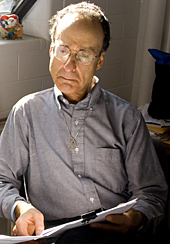AMES, Iowa -- Through his work on two national studies, Warren Blumenfeld helped identify how lesbian, gay, bisexual and transgendered (LGBT) students are significantly harassed -- both on their college campuses and online through cyberbullying. And now he'll get a chance to contribute ideas on how best to improve that condition across the country.
Blumenfeld, an associate professor of curriculum and instruction at Iowa State University, has been invited by the U.S. Department of Education's Higher Education Center for Alcohol, Drug Abuse and Violence Prevention to participate in a two-day meeting to explore strategies on how to improve the climate of LGBT students on college and university campuses. The event will take place April 4-5 in Washington, D.C.
Blumenfeld was one of four researchers who conducted "The 2010 State of Higher Education for LGBT People" -- the most comprehensive national study of its kind, with data collected from nearly 6,000 students, faculty, staff and administrators who identify as lesbian, gay, bisexual and transgender at U.S. colleges and universities. Sponsored by Campus Pride -- a national non-profit working to create safer, more LGBT-inclusive colleges -- the study highlighted significant harassment of LGBT students and a lack of safety and inclusiveness on campuses across the country.
"All of us who have been part of the research on the national study have been invited to this summit, along with other individuals throughout the country who have been interested in and are doing research on this topic," Blumenfeld said.
Iowa State takes important step
While Blumenfeld says all colleges and universities could stand to make their campuses safer and more welcoming to LGBT students, he commends Iowa State for taking an important step by hiring a full-time LGBT coordinator, Brad Freihoefer. Iowa State is the only college or university across the state to have a full-time LGBT coordinator.
"In colleges and universities, I think it's really crucial that we have LGBT centers, like the one that we have at Iowa State with a full-time paid coordinator," Blumenfeld said. "That really helps to improve the climate. It gives a center where students can go to learn more, talk, network and be themselves."
But Blumenfeld also sees a need for the development of LGBT policies at colleges and universities too.
"We also need to have policies. I call it the top-down, bottom-up and middle-sideways strategies," he said. "We need to have policies on all of our college and university campuses including and enumerating sexual orientation, sexual identity and gender expression as protected categories in their non-discrimination policies. And those need to be enforced throughout the college and university campus."
Blumenfeld plans to draw upon an earlier paper he authored on how to make colleges and universities safer for LGBT students, faculty, staff and administrators during his participation in the summit. In addition to detailing specific policies, that paper also addressed training and development, services, curriculum/educational materials/academic affairs, employee concerns, and community/off-campus concerns.
LGBT students are not alone
While the Washington summit will address harassment of LGBT students in response to some prominent recent tragedies -- most notably last October's suicide of Rutgers University student Tyler Clementi, which was one of five suicides by gay teenagers in a three-week period -- Blumenfeld is aware of other groups who also endure campus harassment.
"I'm trained in what's called social justice education and what we teach and what we learn is that all of the 'isms' are on this one huge wheel with all of these different spokes," he said. "And the spokes are racism, sexism, Islamaphobia, anti-Semitism, heterosexism, classism, etc. And if you just try and pull out one of the spokes, the wheel still rolls and rolls over people.
"So by looking at this prejudice -- specifically against LGBT people -- we're not in any way advocating that this is the only type of prejudice that we're dealing with because all of the different forms of oppression all run parallel and at points, they do intersect," he continued. "By enumerating the types of categories that we're talking about, we're including gender expression and sexual orientation within a full rubric of the ways we're trying fight against oppression within this society so that everyone wins."
